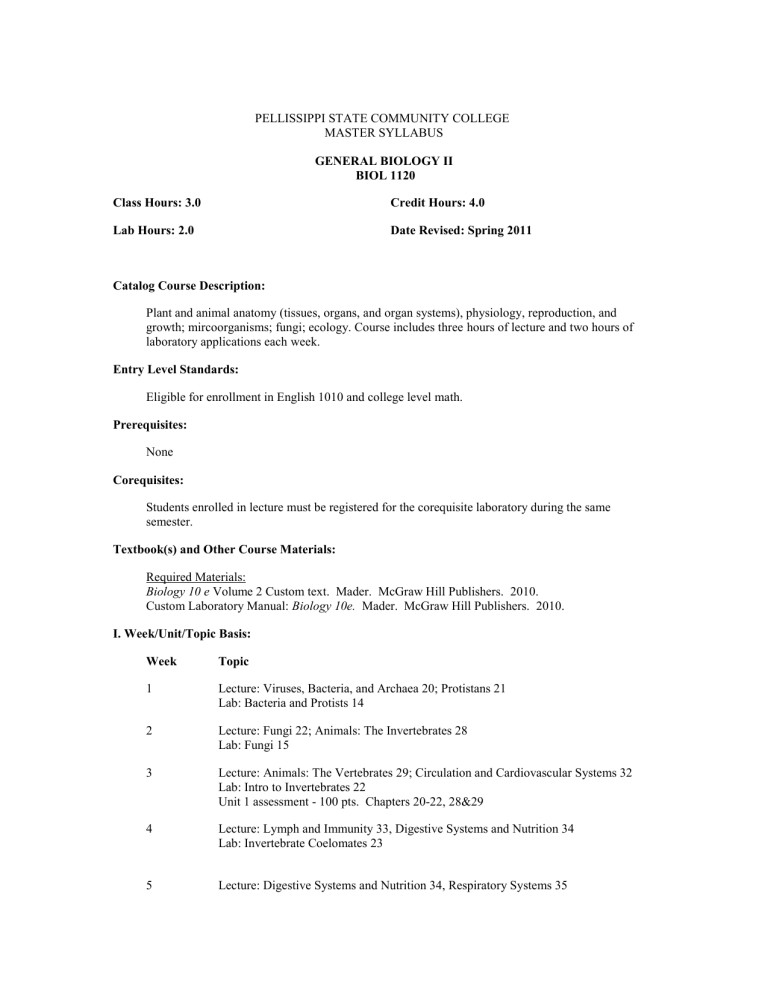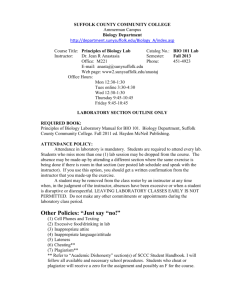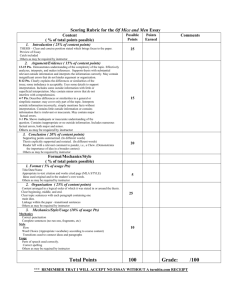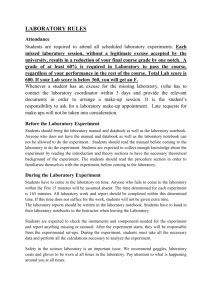BIOL 1120 General Biology II - Pellissippi State Community College

PELLISSIPPI STATE COMMUNITY COLLEGE
MASTER SYLLABUS
GENERAL BIOLOGY II
BIOL 1120
Class Hours: 3.0
Lab Hours: 2.0
Catalog Course Description:
Credit Hours: 4.0
Date Revised: Spring 2011
Plant and animal anatomy (tissues, organs, and organ systems), physiology, reproduction, and growth; mircoorganisms; fungi; ecology. Course includes three hours of lecture and two hours of laboratory applications each week.
Entry Level Standards:
Eligible for enrollment in English 1010 and college level math.
Prerequisites:
None
Corequisites:
Students enrolled in lecture must be registered for the corequisite laboratory during the same semester.
Textbook(s) and Other Course Materials:
Required Materials:
Biology 10 e Volume 2 Custom text. Mader. McGraw Hill Publishers. 2010.
Custom Laboratory Manual: Biology 10e.
Mader. McGraw Hill Publishers. 2010.
I. Week/Unit/Topic Basis:
Week Topic
1
2
Lecture: Viruses, Bacteria, and Archaea 20; Protistans 21
Lab: Bacteria and Protists 14
Lecture: Fungi 22; Animals: The Invertebrates 28
Lab: Fungi 15
3
4
5
Lecture: Animals: The Vertebrates 29; Circulation and Cardiovascular Systems 32
Lab: Intro to Invertebrates 22
Unit 1 assessment - 100 pts. Chapters 20-22, 28&29
Lecture: Lymph and Immunity 33, Digestive Systems and Nutrition 34
Lab: Invertebrate Coelomates 23
Lecture: Digestive Systems and Nutrition 34, Respiratory Systems 35
6
7
8
9
10
11
12
13
14
15
Lab: Mammalian Anatomy I and II 26, 27
Lecture: Respiratory Systems 35, Body Fluid Regulation and Excretory Systems 36
Lab: Lab Practical I (first 5 labs)
Unit 2 assessment – 100 pts Chapters 34, 36-39
Lecture: Neurons and Nervous Systems 37
Lab: No Lab
Lecture: Locomotion and Support Systems 39, Hormones and Endocrine Systems 41
Lab: Homeostasis 29; Blood Typing and Lung Volumes (supplemental handout)
Lecture: Reproductive Systems 41, Plant Diversity 23
Lab: Nervous System and Senses 30; Heart Structure 27
Unit 3 assessment – 100 pts Chapters 40-42, 44
Lecture: Flowering Plants Structure and Organization 24, Flowering Plants Nutrition and Transport 25
Lab: Nonvascular Plants and Seedless Vascular Plants 16; Seed Plants 17
Lecture: Flowering Plants: Control of Growth 26, Flowering Plants: Reproduction 27
Lab: Organization of Flowering Plants 18; Flowers & Seeds 21.1 & 4
Unit 4 assessment – 100 pts Chapters 23-27
Lecture: Population Ecology 44
Lab: Symbiotic Relationships 33; Food Webs (supplemental handout)
Lecture: Community and Ecosystem Ecology 45
Lab: Lab Practical II
Lecture: Temperate Deciduous Forests 46.2, Conservation Biology 47
Lab: No Labs
Unit 5 assessment – 100 pts Chapters 44-47
FINAL EXAM PERIOD - MANDATORY COMPREHENSIVE FINAL; worth approximately 12% of the final grade.
Note – The order of plants varies in spring and fall semesters. Fall semester begins with plants. The weeks without labs vary depending on the specific dates of semester breaks.
II. Course Goals*:
The course will:
A.
B.
Expand student understanding about the diversity and complexity of life so they may become better stewards of our biosphere. V.4
Expand student understanding of the relationship between the structure of something (a tissue, organ, or organism) and its function. V.4
C.
D.
Enhance student understanding of health related problems giving students an ability to communicate more effectively with health care providers. V.3
Guide students to an understanding and appreciation of environmental concerns such as recycling and waste disposal, acid rain, population growth, the introduction of non-native
E.
F. species, the greenhouse effect and global warming. V.3-4
Enhance student ability to interpret related biological information and determine its validity. V.2-3
Enhance student ability to reason and think more critically. V.1-5
*Roman numerals after course objectives reference goals of the Biology program. (Career Program Goals and General Education Goals are listed http://www.pstcc.edu/departments/curriculum_and_instruction/syllabi/ )
III. Expected Student Learning Outcomes*:
Students will be able to:
1.
2.
Describe basic anatomy (tissues, organs, and organ systems), physiology, reproduction, and development of plants and animals. B, C, F
Identify causes and treatments of various basic medical concerns such as ulcers, diabetes, depression, osteoporosis and infertility. B, C, F
3.
4.
5.
6.
7.
8.
Compare and contrast organisms representing the five kingdoms of living things. A, B, D,
F
Identify the importance of organism from the five kingdoms of living things to the health of the biosphere. A, D, F
Explain basic concepts of population growth and community interactions. D, E, F
Describe the major concepts of ecology and environmental concerns. A, D, F
Use dichotomous keys to identify unknown organisms and report data using graphs and tables. E, F
Locate biology related material in the library and online. Evaluate biological information they read about online or see on TV. E, F
9. Interpret and draw conclusions from data presented in graphic form. E, F
* Capital letters after Expected Student Learning Outcomes reference the course goals listed above.
IV. Evaluation:
A. Testing Procedures:
Each lecture unit will be evaluated using one or more tests totaling 100 points. Exams will be a mix of discussion questions and objective questions. There are no makeup lecture tests. There will be a comprehensive final for the course worth 100 points. The comprehensive final may be used to take the place of one missed exam if there is evidence of a valid and reasonable excuse. The comprehensive final exam score may also be used to replace the lowest unit exam score if all exams were attempted.
The additional 50 points associated with lecture will be earned by doing a variety of activities to be determined by your instructor. The activities may include reading and summarizing articles, writing a position paper, attending a seminar, and summarizing a videotape that was viewed.
B. Laboratory Expectations:
Students are expected to attend the lab section for which they are enrolled; lab attendance is required for completion of the course. Students MAY be able to attend an alternate lab section to make up a missed lab if an acceptable excuse is presented and the request is approved by an instructor. Lab review questions must be signed by the make-up lab instructor in order to receive credit. Students must have attended a lab section in order to submit the corresponding lab questions. Laboratory work will not be accepted late .
Students should read the scheduled lab exercise before attending lab. A quiz covering that day’s material or material from a previous lab may be given at the start of lab. There are NO make-up quizzes. After each exercise, students are required to complete the assigned lab review questions. Students are encouraged to work together to complete the questions, but not to plagiarize answers. These lab review questions will be collected and graded on four or more randomly selected dates. It is the student's responsibility to submit their work, if collected, to their lab instructor in a timely fashion.
Missing more than three labs (25%) in a semester will result in failure of the entire course.
Closed toe/heeled shoes are mandatory and garments that cover the legs are recommended. Students are expected to dress appropriately for the laboratory to minimize the possibility of the spread of contamination and risk to personal safety.
Students are required to report to their laboratory instructor any concern for personal safety or injury sustained during various exercises.
Drink, food, and any form of tobacco are not allowed in the classroom or laboratory.
Student Participation in Dissections: During Biology 1120, students will study the anatomy and physiology of vertebrates and invertebrates.
As are ALL laboratory exercises in Biology 1110 and 1120, the laboratory investigations involving dissections are mandatory. All students enrolled in the course are expected to participate. However in consideration of religious and/or moral objections of isolated individuals, students wishing to be excused from the actual physical dissection may petition for a waiver by submitting a written request (supported by pertinent evidence or documentation) to the Biol 1120 lead instructor two weeks prior to the first dissection lab.
Biology faculty members reserve the right to grant or deny waivers. Appeals may be made to the Office of the Vice President for Academic Affairs.
Students granted a waiver for the vertebrate and invertebrate exercises will be excused only from the actual physical dissection and will be expected to attend lab, master all materials presented in laboratory, and be responsible for all assignments and quizzes. All students are required to take the laboratory exams which include material from the animal dissection exercises.
Pregnant students are advised to consult their physician about their attendance of the dissection labs. With proper documentation, alternate activities will be assigned to pregnant students.
C. Field Work:
Students may be required to read supplemental articles or papers on reserve in the library.
D. Other Evaluation Methods:
Other evaluation methods may be arranged at the discretion of the lead instructor and lecture instructor.
E. Grading Scale:
Point Distribution:
Lecture tests and Assignments Laboratory
Unit 1 100 pts. Post-lab questions 60 pts. (4x15)
Unit 2 100 pts. Pre-lab quizzes 20 pts. (4x5)
Unit 3 100 pts. Leaf collection 40 pts
Unit 4 100 pts.
Unit 5 100 pts. Lab Practical - 1 50 pts.
Comp. Final 100 pts. Lab Practical - 2 45 pts.
Assignments 50 pts. TOTAL 215pts.
TOTAL 650 pts.
V. Policies:
Letter grades will be distributed as follows:
A 90% and above 778 or more points earned
B+ 87-89% 752-777 points
B 80-86% 692-751 points
C+ 77-79% 666-691 points
C 70-76% 604-665 points
D 60-69% 519-603 points
F 59% and below 518 or fewer
A. Attendance Policy:
Pellissippi State expects students to attend all scheduled instructional activities. As a minimum, students in all courses (excluding distance learning courses) must be present for at least 75 percent of their scheduled class and laboratory meetings in order to receive credit for the course. Individual departments/programs/disciplines, with the approval of the vice president of the Learning Division, may have requirements that are more stringent. In very specific circumstances, an appeal of the policy may be addressed to the head of the department in which the course was taken. If further action is warranted, the appeal may be addressed to the vice president of the Learning Division.
B. Academic Dishonesty:
Academic misconduct committed either directly or indirectly by an individual or group is subject to disciplinary action. Prohibited activities include but are not limited to the following practices:
• Cheating, including but not limited to unauthorized assistance from material, people, or devices when taking a test, quiz, or examination; writing papers or reports; solving problems; or completing academic assignments.
• Plagiarism, including but not limited to paraphrasing, summarizing, or directly quoting published or unpublished work of another person, including online or computerized services, without proper documentation of the original source.
• Purchasing or otherwise obtaining prewritten essays, research papers, or materials prepared by another person or agency that sells term papers or other academic materials to be presented as one’s own work.
• Taking an exam for another student.
• Providing others with information and/or answers regarding exams, quizzes, homework or other classroom assignments unless explicitly authorized by the instructor.
• Any of the above occurring within the Web or distance learning environment.
C. Accommodations for disabilities:
Students who need accommodations because of a disability, have emergency medical information to share, or need special arrangements in case the building must be evacuated should inform the instructor immediately, privately after class or in her or his office. Students must present a current accommodation plan from a staff member in Services for Students with
Disabilities (SSWD) in order to receive accommodations in this course. Services for Students
with Disabilities may be contacted by going to Goins 127, 132, 134, 135, 131 or by phone:
539-7153 or TTY 694-6429.
More information is available at www.pstcc.edu/departments/swd/ .
D. Other Policies:
LABORATORY SUBSTITUTION POLICY:
There maybe a time during the semester that you will not be able to attend your regularly scheduled laboratory section. Since attendance is so critical to your laboratory grade, we do have a policy that will allow you to attend an alternate lab section ONE time during the semester. Lab substitution is only allowed in the case of an emergency and with adequate approval.
When attending an alternate lab, the STUDENT has the following responsibilities:
a. The student must inform his/her regular instructor, and obtain permission from the substituting instructor. A schedule of lab times and instructors is posted outside the laboratory door. A student should not assume that they could just "show up" and participate in an alternate lab.
b. The student must obtain a signature and date from the substituting instructor at the top of the laboratory report for that particular exercise.
c. If the substituting instructor collects laboratory report questions, the student MUST write the name of his/her regular instructor at the top of those documents. This will enable the substituting instructor to make the regular instructor aware of your attendance.
d. If the substituting instructor did not collect laboratory report questions, it is the student's responsibility to find out if they missed an assignment from their regular instructor as quickly as possible. The regular instructor will advise the student of options.




